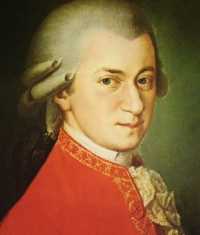Mozart’s Genius and MasonryBrother Bruce Young traces the connections between music and Masonry. He is Treasurer of the German-speaking Pilgrim Lodge, No. 238 meeting in London. He has devoted much study to Mozart, and is a graduate in music. His paperwas published in Freemasonry Today. In the year 2006, Austria was celebrating the 250thanniversary of the birth, on 27 January 1756, of Wolfgang Amadeus Mozart, one of the greatest composers of all time. In Salzburg, the city of his birth, celebrationsinclude performance of all his operas; in Vienna, celebrations under the banner of Mozart Year 2006 were taking place, including substantial exhibitions at the refurbished house in the Domgasse near the cathedral, where he wrote Figaro, and a comprehensive exhibition at the Albertina Art Gallery: The Enlightenment: An Experiment’. The Austrian Post Office has issued a commemorative set of postage stamps depicting Mozart artefacts, and Mozart at his Lodge in Vienna.Mozart was the youngest child and only surviving son of Leopold Mozart, who was himself a distinguished musician. But Leopold was a dictatorial man, not easy to get on with, as can be seen from the extensive correspondence between father and son, and he was also ruthless in promoting his young prodigy. Wolfgang travelled the length and breadth of Europe as a very young man, playing in many courts and distinguished venues under the guidance of his father. Before the age of ten he had visited Munich, Augsburg, Milan, Paris, Naples and London. Mozart’s mother died while travellingwith him in Paris, in 1778 when he was 22 years old, and this was a bitter blow to the young man. Eventually he married Constanze Weber, without his father’s approval, whilst in Vienna.This signalled the point at which Mozart seemed to shake off the overbearing influence of his domineering father. His marriage to Constanze marked not only a break with his father, but with much of his past life. Up to this time, he had been Concert Master in Prince-Bishop Colloredo’s entourage in Salzburg, but his move to Vienna then gave Mozart an entree to a bustling imperial capital of over 200,000 people, of whom no less than 600 described themselves in the census as ‘composer’.Mozart found that he was able to cross the social divide andmix freely and to get work, the highest-paid in society. His fee from a single concert equalled half his annual salary in Salzburg. His status also improved, as he wrote to his father: ‘All possible honours is shown me’ and he eventually, in 1787, became Court Chamber Musician as a result of which a substantial corpus of delightful minuets, German dance and contredanses written for the Court balls has come down to us.Freemasonry and Viennese Society.
Reference image: http://freemasons-freemasonry.com

